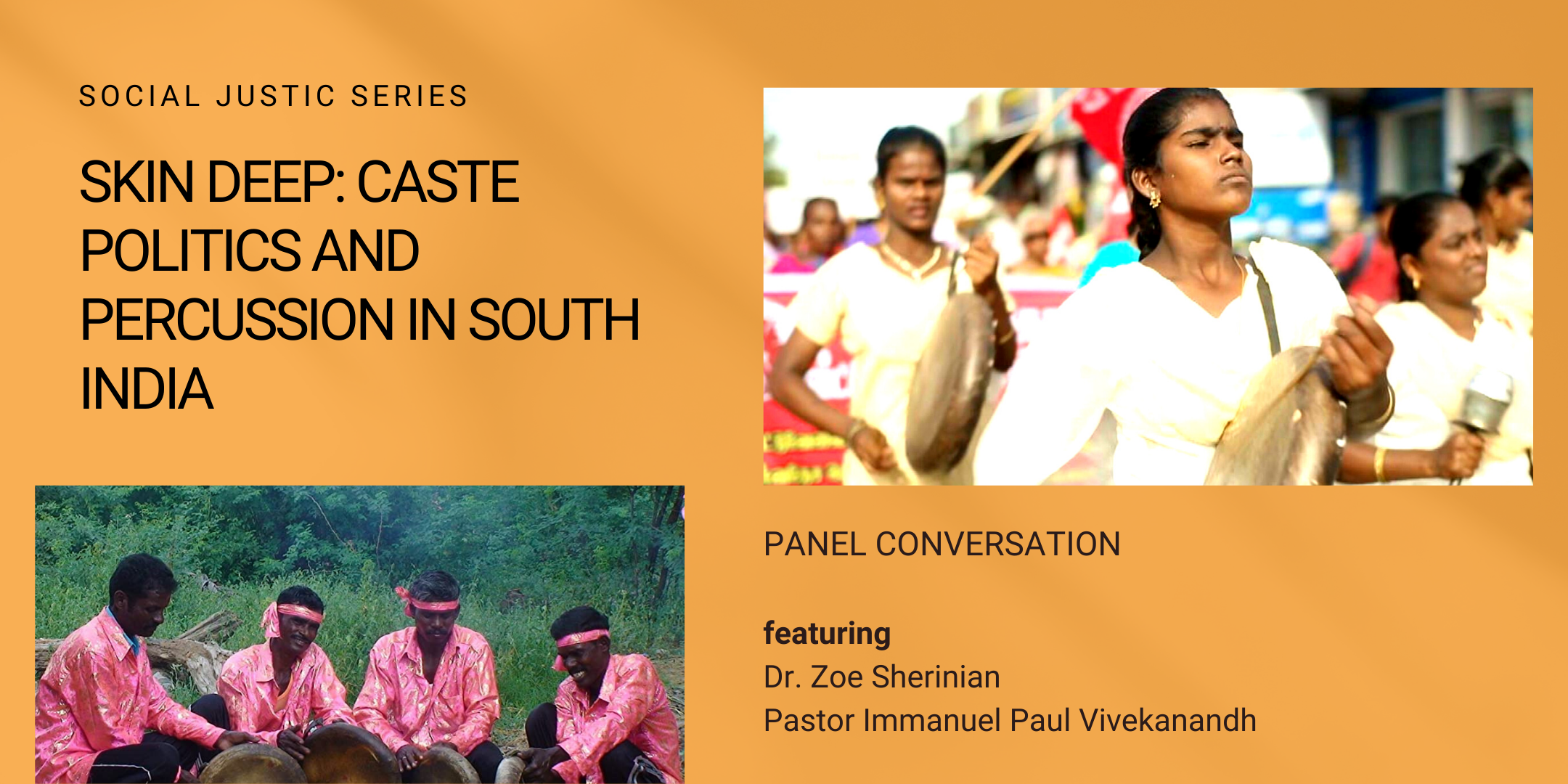
Panel Conversation | Skin Deep: Caste Politics and South Indian Percussion
Join us for the final panel event of our series “Skin Deep: Caste Politics and South Indian Percussion.” This event will feature Dr. Zoe Sherinian (University of Oklahoma) and Pastor Immanuel Paul Vivekanandh to offer their thoughts on the intersections of caste, gender, and faith in South Indian performance traditions. Throughout this panel, we will focus on issues touched on in our previous events, such as the history and Dalit reclamation of parai drumming, the relationships between mridangam-makers and mridangam-performers, and how caste and gender dynamics inform the worlds of percussion performance in South India and the larger diaspora communities.
After the panelists discussion, we will open the floor to questions from the audience. We look forward to reflecting on the lessons learned throughout this month and taking them forward into our art and communities together.
Dr. Zoe Sherinian is Professor of Ethnomusicology and Division Chair at the University of Oklahoma. Sherinian’s research engages the intersectional relationship between caste, class, gender and music in South Asia. She has published the book Tamil Folk Music as Dalit Liberation Theology. She has also produced and directed two documentary films screened at BRM: "This is A Music: Reclaiming an Untouchable Drum" (2011), on the changing status of Dalit (outcaste) drummers in India, and "Sakthi Vibrations" (2018), on the use of Tamil folk arts to develop self-esteem in young Dalit women at the Sakthi Folk Cultural Centre.
Pastor Immanuel Paul Vivekanandh is a pastor, parai player, and visual artist. Currently pursuing his PhD in Ethics, Church, and Society at the Lutheran School of Theology in Chicago, his arts and activism explores the intersections between caste, gender, and faith. He was the former Artist in Residence at the McCormick Theological Seminary and continues to play and teach parai in Chicago.
-----------------------------------------------------
About the series: Skin Deep: Caste Politics and Percussion in South India
Between the worlds of classical Carnatic music and the popular kuthu folk music, there are clear distinctions in the ways that the South Asian caste system - derived from the Hindu varnā hierarchy and enforced through Hindu legal codes such as the Manusmriti - shapes access to and success across South Indian (and, indeed, all South Asian) artistic spaces. Where Brahmins and other dominator-caste groups are afforded near-exclusive ownership of classical and religious musical spaces, kalavantulu and isai vellalar (hereditary performing artists) and Dalit communities are rarely credited for birthing and preserving the unique musical practices that define South Indian artistic spaces. These politics of performance are carried over to the diaspora where predominantly dominant-caste performers in the United States engage with Carnatic repertoires created largely by dominant-caste, Hindu men.
The second season of our Social Justice Series is therefore dedicated to identifying caste dynamics and inequalities in music, specifically as they manifest in South Indian percussion traditions. From the mridangam in Carnatic music to the parai drum in folk traditions, caste-oppressed communities possess the unique expertise needed to procure, tan, and construct drum membranes from animal hides. The systemic inequities that these drum-makers and drummers have experienced is largely overshadowed by dominant-caste performers’ appropriation from and erasure of their efforts. In this season, we center not only the ways oppressed-caste communities have contributed to Carnatic music but, significantly, the ways that their unique folk percussion traditions give rise to intersectional Dalit feminist liberation movements.
Due to the embedded and still very present nature of casteism in both South Asian and diaspora artistic communities, we strongly encourage all participants in our events to self-educate on the origins of and continuing legacies of the caste system:
- “The Annihilation of Caste” by B.R. Ambedkar (1936) is cited as the foremost text and critical reading for all interested in Dalit liberation movements
- Caste: The Origin of Our Discontents by Isabel Wilkerson (2020) which explores the South Asian caste system in discussion with racism in the United States
- Equality Labs is a U.S.-based organization responsible for leading anti-caste advocacy in America (including in the technology sector and education). Their report Caste in the United States is a necessary expose on the ways South Asian casteism is transferred to and preserved within the American diaspora.
The Social Justice Series is curated by Program Lead, Amita Vempati. Amita pivoted to the world of community arts and advocacy having worked on education and human rights initiatives in South Asia, Central Asia, and Eastern Europe. Having trained in Carnatic, Hindustani, and many other global musical traditions, she uses both political and artistic insights to examine how art can be a force for critical self-reflection and change.
